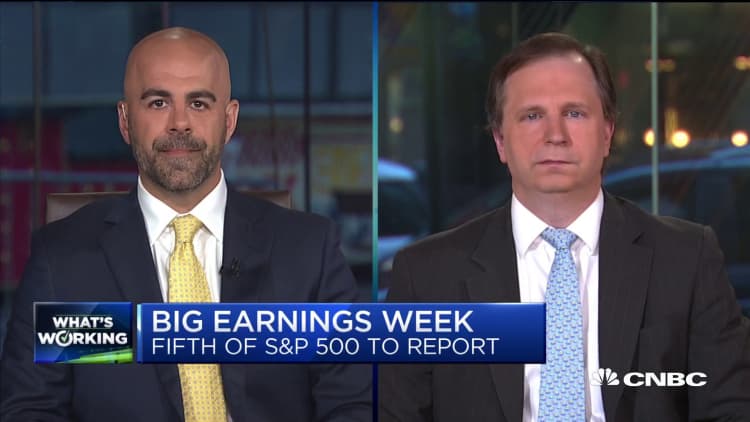
Stocks posted a muted performance on Monday as the busiest week of the corporate earnings season kicked off.
The Dow Jones Industrial Average fell 48.49 points to 26,511.05, the a gain in energy shares lifted the by 0.1% to 2,907.97. The Nasdaq Composite outperformed, climbing 0.2% to 8,015.27.
Boeing contributed the most to the Dow's losses, falling 1.3% after The New York Times reported that workers at the company's 787 jet plant have complained about shoddy production and bad safety practices.
More than 140 S&P 500 companies are scheduled to release their quarterly results this week, including Coca Cola, Procter & Gamble, United Technologies, Verizon, Twitter, Lockheed Martin and eBay. Facebook, Microsoft and Tesla Motors are also set to report later this week.
Halliburton and Kimberly-Clark are among the companies that reported better-than-expected quarterly results on Monday morning. Their shares rose 0.3% and 6.1%, respectively.
So far, the majority of corporate earnings reports have topped expectations. FactSet data shows 76.5% of the S&P 500 companies that have posted earnings have surpassed analyst estimates. Analysts came into the season with low expectations, forecasting a 4.2% drop in profits.
"First-quarter earnings are coming in slightly better, so it's removed some of the concern from the market," said Robert Pavlik, chief investment strategist at SlateStone Wealth. "But not enough to move investors out of the sidelines."
"I think that's one of the reasons the market is consolidating," he said.
Sentiment was also muted on Monday after the South China Morning Post reported China's policy-making committee will pursue structural changes to its economy, rather than add stimulus. Chinese stocks closed sharply lower overnight, with the Shanghai Composite losing 1.7% while the Shenzhen A Shares index declined 1.5%.
Wall Street also focused on the oil market as U.S. crude rose 2.7% after the Trump administration said it will not allow the purchase of Iranian oil by some countries. The move could take about 1 million barrels per day out of the oil market. Energy shares rose along with oil prices. The Energy Select Sector SPDR Fund (XLE) closed 2.1% higher, led by Marathon Oil and Devon Energy.
Investors came into Monday's session after a mixed weekly performance. The Dow and Nasdaq posted marginal gains last week, while the S&P 500 snapped a three-week winning streak.
Still, the major indexes remain within striking distance of record highs set last year. The Dow, S&P 500 and Nasdaq are all within 2% of reaching their records.
John Davi, chief investment officer at Astoria Portfolio Advisors, said positioning in stocks is "still fairly light," adding: "A better-than-expected earnings season is probably needed for people to get more comfortable."
Still, "companies are doing OK relative to what was priced into the market," he said. "I think we probably break the all-time high and then we consolidate more towards the summer."
On the data front, existing home sales for March fell 4.9% to a seasonally adjusted annual rate of 5.21 million. The drop last month came after an 11.2% surge in February.
—CNBC's Holly Ellyatt contributed to this report.


